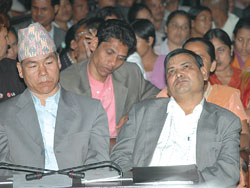|
|
How does Nepal look from abroad for people of Nepali origin? For some time now, it has been looking like a country cursed with chronic uncertainty.
To be sure, instability is not unique to Nepal. Most countries go through periods of uncertainty. And among intellectuals, there is a great deal of uncertainty about uncertainty itself. Some think it gives society a certain tension that brings forth vitality and creativity, it brings imagination and the possibility to begin things anew. Certitude doesn't foster these traits.
But a modern nation state can't flounder in uncertainty for too long. A few months or a year of instability won't do much harm, but if it persists and dominates society uncertainty will breed more uncertainties and becomes self-perpetuating. Not all countries are able to break this vicious cycle, development turns into destruction. This could turn counterproductive even for those who are responsible for keeping things uncertain.
Extended periods of uncertainty give forces that benefit from it the chance to rise up again. We can see that this is already starting to happen in Nepal, and those who thrive in uncertainty are sure to try to prolong it. If there is one big goal that the Nepali nation has in front of it, it is to end this period of uncertainty. After all, is the country meant for its inhabitants or are the inhabitants meant for the country? If there are no inhabitants there can be no country, there can even be inhabitants without a country. But there can be no citizens without a country.
There are many ways to get out of this cloud of uncertainty, and it seems that the efforts of Nepal's intellectuals and leaders have not been enough. They haven't been able to look beyond their vested interests. They aren't looking beyond their own interests at the national interest as they should be.
Nepalis have always been complacent. We love to predict the future, but not prepare ourselves for it. We regard anyone who criticizes us as an enemy. Even so, the solutions to Nepal's problems must come from Nepalis themselves. The solution won't fall from the sky, it won't be wafted here from the south or north. It must be from this soil, it must suit Nepal. If not today, then surely tomorrow.
The English praised Nepalis for being "brave Gurkhas" and Nepalis let that get into their heads. They are proud that they were never colonized, but they should be able to see how they are being ransacked by those same powers. They must try to recognize the new modern avatars of colonialism.
Today, Nepalis outside Nepal see Nepal as a poor, backward country. Just as a son may disown a mother dressed in rags, Nepalis outside Nepal are trying to cut themselves off from Nepal's history, language and culture.
Even if Nepalis can't remove the pahad-madhes gap, the male-female disparity or ethnic discrimination, they must at least try. They must try to overcome their economic, social, educational failures. They must be able to stand on their own feet and not be dependent on outsiders. Only then can Nepalis be truly proud of being Nepalis.
Instead of boasting that this is the country where the Buddha was born, Nepalis should be able to live in peace. Instead of showing off about Mt Everest they should be able to stand above ethnic, linguistics and regional differences.
Nepalis should not panic at such a long wishlist. Obiously, these problems can't be resolved overnight. It needs time, patience, but above all it takes imagination. If Nepalis can imagine a future, it is not difficult to draw up a blueprint. Once there is a blueprint, the house can be built sooner or later.
For a bright future, Nepalis don't need dreams, they need imagination.
Tanka Subba is professor of Anthropology at North-eastern Hill University, Shillong, India. This is a translation of the keynote lecture he delivered at the Madan Puraskar Award ceremony on 13 October in Kathmandu.




